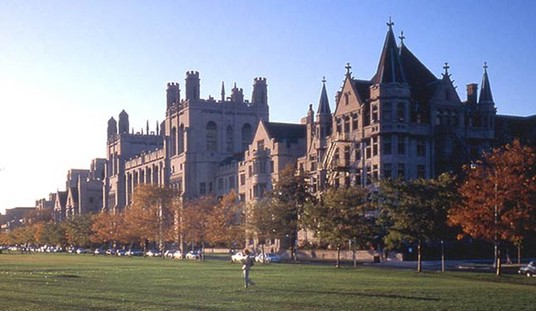Twitter CEO Jack Dorsey gave an interview to NYU professor Jay Rosen and a transcript of the interview was published at Recode. It’s an interesting interview but one highlight is when Rosen asks about what Dorsey has been hearing from conservatives on his “listening tour.” In the midst of answering that question, Dorsey admits that conservatives don’t feel free to speak up at Twitter, and that bothers him a bit.
To really appreciate this you need to know that Jay Rosen isn’t what you would call a neutral observer. He’s definitely coming from a left-wing perspective and if you look at his Twitter feed you’ll see that. So, for instance, he’s one of the people who was bothered that Facebook allowed someone at the Weekly Standard to fact-check someone at Think Progress (my take on that here). Rosen’s own perspective is clearly on display in this interview with Dorsey. He opens this part of the talk with a pretty open-ended question about conservatives:
What has been your experience in your listening tour, especially with conservatives? What have you learned?
Well, first and foremost, at least I personally have not tended to have conversations with many people in a more conservative end of the spectrum or right end of the spectrum, so goal number one was to say that we’re here, be present, and see the folks who I personally haven’t talked to, and as an organization, we tend not to naturally lean towards, and I don’t know if there are any fundamentally different learnings that are different from the conversations that we have with folks who are more on the left end of the spectrum, more of the liberal end of the spectrum or libertarian end of the spectrum, wherever that lies.
So, there’s a lot of questions as to how — well, why we make decisions the way we make them, how the algorithms work, a lot of questions around timeline ranking, and that changed three years ago. It was the first time we really applied machine learning to where people spent the majority of their time within the service, and some confusion about that. I think there was a question as to why there haven’t been a lot of conversations with people on the more conservative end of the spectrum in the past. There was a desire to have more. There’s a desire to be able to have an open feedback channel, and I don’t know, always good conversations. We had some folks from the media in every one of these. We had some folks in politics, some folks in academia, some technology folks, and pretty good.
Rosen clearly isn’t getting what he wants so he makes the follow up more pointed:
Mm-hmm. You say they’re similar to conversations, people on the left side of the spectrum, but people on the left side of the spectrum aren’t accusing Twitter of shadow banning their voices, are they?
The people we talked to didn’t really accuse us of shadow banning their voices.
Again, not the answer Rosen wanted. He asks again, this time in clear disbelief:
They didn’t? They didn’t accuse you of bias against conservatives?
They asked questions as to whether a bias within the company would translate into the service and into actions, but it was all questions rooted in, “I follow this person. Why am I not seeing their tweets in my timeline?” The majority of the questions I got about shadow banning and bias were either on Twitter or within the Congressional hearing.
So, public performances, where there was some external audience to perform for.
Rosen is not being fair here. Twitter admitted there was a problem in their algorithm which was unfairly penalizing about 600,000 users, including some high profile conservatives (and to be fair some progressives as well). It has also admitted to ranking tweets based partially on things like block lists which, in my experience, are used on the political left more than they are on the political right. So there really is something here worth examining that goes beyond political performance art. Shadow-banning may be the wrong word for it but these machine learning choices are not always free of partisan impact.
The next question is about why Jack decided to admit Twitter is a left-leaning company. And here’s where Dorsey says he believes people on the right who work there and don’t feel comfortable speaking up because of the institutional bias.
Why did you go public with this generalization that people in Twitter are generally liberal or lean left, and that’s our culture, which I have no trouble believing is true, but why did you start talking about that?
I think it’s more and more important to at least clarify what our own bias leans towards, and just express it. I’d rather know what someone biases to rather than try to interpret through their actions. So, if we can say that, and also have the freedom to evolve and change, then at least people know it, and I think it allows us to remove that a little bit more from the work, but it has to be proven out in our actions as well, so … I mean, we have a lot of conservative-leaning folks in the company as well, and to be honest, they don’t feel safe to express their opinions at the company.
They do feel silenced by just the general swirl of what they perceive to be the broader percentage of leanings within the company, and I don’t think that’s fair or right. We should make sure that everyone feels safe to express themselves within the company, no matter where they come from and what their background is. I mean, my dad was a Republican. When I was growing up, was on the radio all the time with Rush Limbaugh and Sean Hannity, so my mom was on the opposite end of the spectrum and …
Right. I read about that in another interview you did. Yeah.
Yeah, and I appreciate that, and I always felt safe to challenge both of them, especially my dad, and so it was definitely a privilege, but if we’re creating a culture that doesn’t enable people or empower people to speak up or not, we’re gonna be able to do that for our service.
There’s a lot more to the interview, but it’s certainly interesting that Jack Dorsey seems aware and somewhat concerned that even his own employees feel the pressure to be politically correct for fear of offending someone. Rosen’s reply is that while he sees the issue he wonders why these people don’t just stand up for themselves more.
The answer, of course, is that when nearly the whole company right up to the CEO is on the partisan left (as we just saw at Google) you are risking your job to disagree. All you have to do is look at what happened to James Damore or Brendan Eich to know some opinions are not welcome and can get you fired.







Join the conversation as a VIP Member